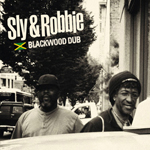|
|
 |
Dusted Reviews
Artist: Sly & Robbie Album: Blackwood Dub Label: Groove Attack Review date: Apr. 16, 2012 |

|
|
|
 |
If the old saw that you can’t go home again should apply to anyone, it’s Sly Dunbar and Robbie Shakespeare. After the drums and bass team rose to the top of Jamaica’s music scene in the mid 1970s, they moved on to back such non-island talent as Bob Dylan, Joe Cocker, and just about any mope who could swing the fees at Compass Point. While they have maintained a parallel career playing dancehall fare whilst raking in the bucks as session stars, they’ve stayed about as true to their roots-reggae roots as Miles Davis did to the music he played with Charlie Parker.
But here they are, playing dub like the past 25 years haven’t happened. The reason why is in the title; Blackwood Dub is named for Alberto “Burur” Blackwood, a dancehall producer and the engineer of this session. He booked the duo into Harry J Studio, which was a top of the line joint back in the ’70s, with bands heavy on names like Skully, Sticky Thompson, Hansel Collins and Mikey Mao Chung, names you’d know if you read instrumental credits for Island Records reggae releases back when Bob Marley was still alive. The album’s 10 tracks subscribe to a somewhat revisionist notion of dub, but it’s one that’s stuck around for longer than the original idea. They didn’t take existing tracks and remix them into something different and strange, but composed new grooves. They aren’t operating from the convergence of economic necessity and outlaw engineering that birthed dub, but an established notion of what sounds dubby. So you aren’t going to hear any ghost vocal tracks. What you will get is music that very effectively recreates a somewhat hoary but still potent notion of what dub should sound like.
The recording is pro and the production never gets too whacked out, but there’s plenty of space between the bass notes for scampering echoes and Sly’s syndrums. In 1980, his electronic beats were the flavor of the moment. Now they’re nostalgic, but still as boingy as a superball flung into a tiled bathroom. The music exists in a pan-temporal zone, not quite sounding like 1980, but admitting very few sounds that have been introduced since then. The keyboardists stick mostly to delayed piano notes. Aside from a few not-too-gauche flourishes early in the record, the guitarists stick to choppy rhythms and sparse, hooky leads that melt into Robbie’s bass lines, which manage to be simultaneously repetitive and catchy.
The farther you go into the record, the better it gets. The sidemen recede and nearly disappear, giving the drums and bass not just the center stage, but the aisles, the rafters and the doors in and out of the house. It’s a three-dimensional monument to beats and low frequencies, refreshingly true to the past without sounding stuffed and mounted.
I wouldn’t trade Blackwood Dub for any of my vintage Lee Perry, Niney the Observer, or King Tubby, but it’d sound just fine sequenced right after Black Uhuru’s Red.
By Bill Meyer
|







